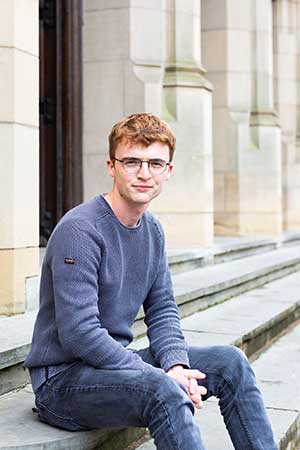PhD English Literature student William Bateman co-founded the D H Lawrence Studies Research Network whilst at Birmingham. We find out more about his experience as a researcher at the University of Birmingham.
 Why did you choose to study a PhD in English Literature?
Why did you choose to study a PhD in English Literature?
“I passionately believe in the power of literature to inspire original thought, debate and ultimately change, in both society and culture. Throughout both my undergraduate and postgraduate studies here at Birmingham, I had developed a fascination with the empathetic quality of literature; the power of literature to take us outside of ourselves and provide insight and understanding into the experiences of others. The opportunity to engage in three years of in-depth study in English Literature therefore offered me the chance to not only to engage in three years of research into my research specialisms, but also to develop a more comprehensive understanding of how literature and narrative informs and influences our responses to the world around us. On a more practical level, I also aspire to a career in literary academia for which a PhD provides essential training and experience.”
Why did you choose to undertake research at the University of Birmingham?
“I completed both my BA and MA in the Department of English Literature at Birmingham. Throughout my time in the department I have always felt encouraged and supported by the members of academic and administrative staff who comprise it. Having had such a positive experience, I knew the benefit of having established working relationships with the staff in the department and school. While I had considered applying to other universities, my research interests lie mainly in the field of literary modernism for which the department at Birmingham is at the forefront internationally. For this reason, it made sense to undertake research here. As well as this, the research community is particularly active in the department and I was keen to get involved with the numerous reading groups and research centres run by staff and post-graduate researchers, for example the Centre for Modernist Cultures. More widely, the campus at Birmingham is a great environment to work in on account of both its beauty and the energy of the researchers who inhabit it. The city of Birmingham has both energy and personality and I have always enjoyed the diverse array of events and opportunities the city offers.”
What are the best things about your course?
“One of the best aspects of my PhD is the extensive support I receive from my supervisors. I could not overstate the importance of having a strong supervisory team. Throughout my PhD, my supervisors have consistently offered me excellent advice with regards to both the content and conduct of my research which I hope will enable me to produce a high quality thesis. They have also provided me with useful practical guidance for how to make my PhD attractive to future employers.”
What is life like as a researcher at the University of Birmingham?
“The energy of the research community in the Department of English Literature provides a lot of opportunities for collaboration through both research groups and events. While I spend the majority of my time focussing on my thesis, there is also ample opportunity to network and collaborate with other PhD students. In the first year of my PhD, for example, I have co-founded the D H Lawrence Studies Research Network with one of my friends and peers in the department. In this sense, your life as a researcher is what you make it; you have enough time and support to really take advantage of the extensive resources and support on offer in the department.”
Outside of your research, what experience have you gained and how will it help you in the future?
“Outside of my research I have completed modules offered by the Higher Education Futures Institute at Birmingham focussing on the nature and practice of teaching in a higher education context. These will, hopefully, provide me with a basic understanding of the principles which inform and direct higher education teaching, which will be useful should I achieve a career in higher education. In a different context, I co-founded the DH Lawrence Studies Post-Graduate Research Network, which aims to connect post-graduate researchers nationally who are working in the field of DH Lawrence Studies through a monthly reading group and regular visiting speakers. The experience has provided me with a range of practical skills and experience, for example, in writing effective funding applications and in planning, publicising and leading sessions for our monthly reading group. These skills would be useful in wide range of careers both inside and outside of academia.”
Find out more studying for a PhD in English Literature over on our course pages.